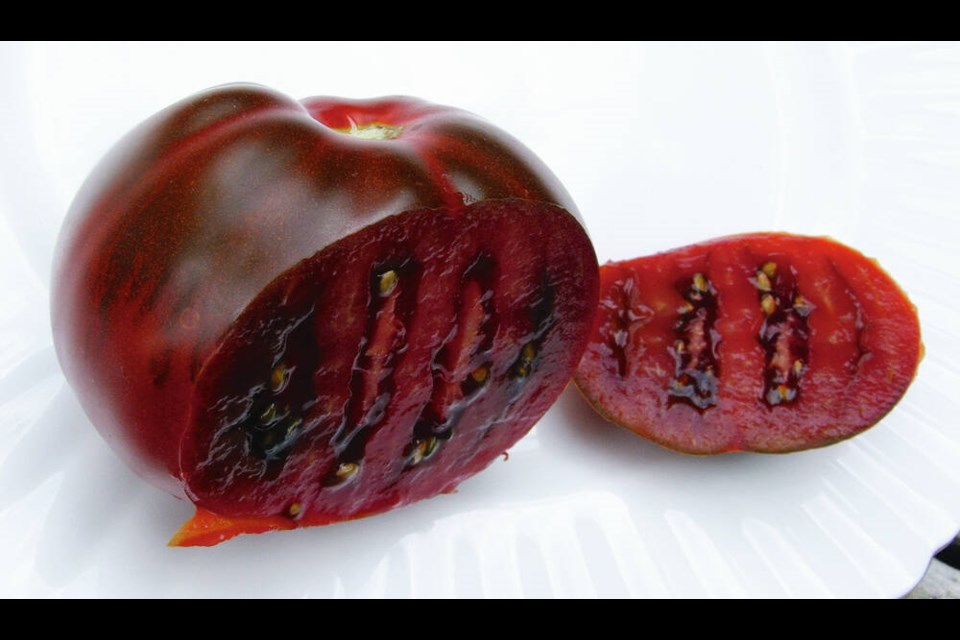Dear Helen: What were your best tomatoes this year? I’m particularly interested in varieties that produce the longest, into autumn.
GE.
Since 1994, when it was introduced as an All-America Selections award winner, Big Beef has been the backbone of my tomato plantings. It is easy to grow well. The plants are always sturdy, very healthy, and wonderfully productive of fruits with a rich tomato flavour.
Big Beef is an indeterminate tomato. I grow it, along with other staking tomatoes, on strong wire fencing. Most catalogues and online seed lists include Big Beef. It’s become a popular standard over the years. Transplants are often available at garden centres too.
When I took down the tomato vines on Nov. 2 this year, I was surprised to find several tomatoes still in excellent eating condition on the plants. They all were Salvaterra’s Select, an heirloom paste tomato with a meaty texture and a fine, tangy flavour.
I enjoyed those last tomatoes immensely, cut into pieces and placed on a bed of finely chopped kale and lettuce and joined by thin, sweet Kelsae onion rings, chunks of tuna, and cut-up hard-boiled egg, all drizzled with a creamy garlic dressing.
Salvaterra’s Select has become another standard favourite, along with Japanese Black Trifele, a good producer of richly flavourful tomatoes. Seeds for both varieties are available from Seed Savers Exchange, a wonderful source for the best of heirloom vegetables and flowers.
Dear Helen: I have noted that you describe the soil in your garden as sandy and fast-draining. Mine is just the opposite — clay. How can I lighten and aerate my soil and improve its drainage?
T.B.
In my half-acre Vernon garden, the soil was hard-packed clay. It was both a back-beaker and the most wonderfully productive garden I’ve ever had. I found that grass clippings from the large lawn, mixed half and half with aged sawdust, made a perfect summer mulch between rows and around plants. Dug or cultivated into the soil in the fall, that blend worked better than anything else I tried to break up the dense clay.
The climate was different. Our winter rains tend to keep clay soils saturated into spring, when plantings often must be delayed until the ground is no longer wet. For faster draining and warming, raised beds help, and additions of organic matter do improve soil texture over time.
Dear Helen: What do “determinate” and “indeterminate” mean in tomato descriptions? Are they grown differently and is one kind better than the other?
W.P.
Determinate tomatoes are bush tomatoes. They grow to a fixed (“determined”) size and are not pruned of sucker growth except enough to provide adequate circulation of air through the plant.
Indeterminate tomatoes are grown against stakes or some other sturdy support. Their size is not “determined.” The plants keep on growing until wilted by cold weather. To prevent a muddled tangle of growth, sprigs of growth that emerge in the V shapes created where leaf stems meet the main stem are snapped off while they are still small. In this way, each plant can be kept to a single stem, with the optimal exposure to sunlight and air that leads to healthy, productive growth.
Traditionally, in our cool-summer climate, staking tomatoes have been preferred because maximum exposure to air and sun was needed to ripen fruit and prevent diseases. Summer weather in recent years had certainly veered away from the “cool summer” category, and who knows what the coming summer and those following will bring?
Because of uncertainty around future weather patterns, we gardeners will do well to take stock of conditions in our gardens, including the moisture-holding quality of the soil and exposure to sun. Improving soil conditions and selecting flowers and vegetables that best suit a garden’s environment will be helpful.
Time out. I’ll be taking a break from writing the next few columns. I’ll be back on Wednesday, Jan. 11. Like many gardeners, I’ll be scouring seed lists over the holidays and preparing for the first plantings of the year. A very Happy New Year to all.
Qualicum meeting. The Qualicum Beach Garden Club will meet on Tuesday, Jan. 10, at 7:30 p.m. in the Qualicum Civic Centre, 747 Jones St. Alexey Tretyakov will speak about the hobby of orchid growing. Doors open at 7.



